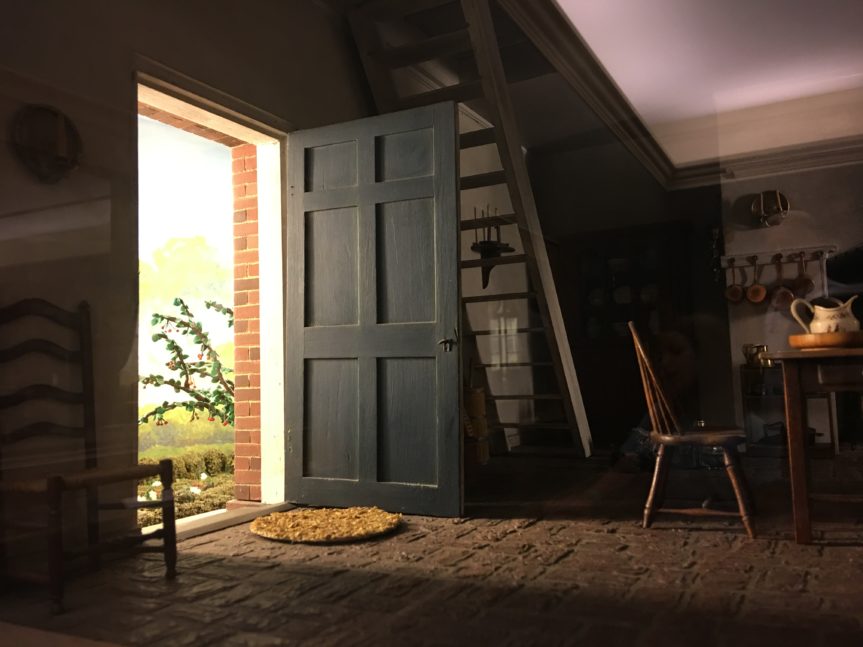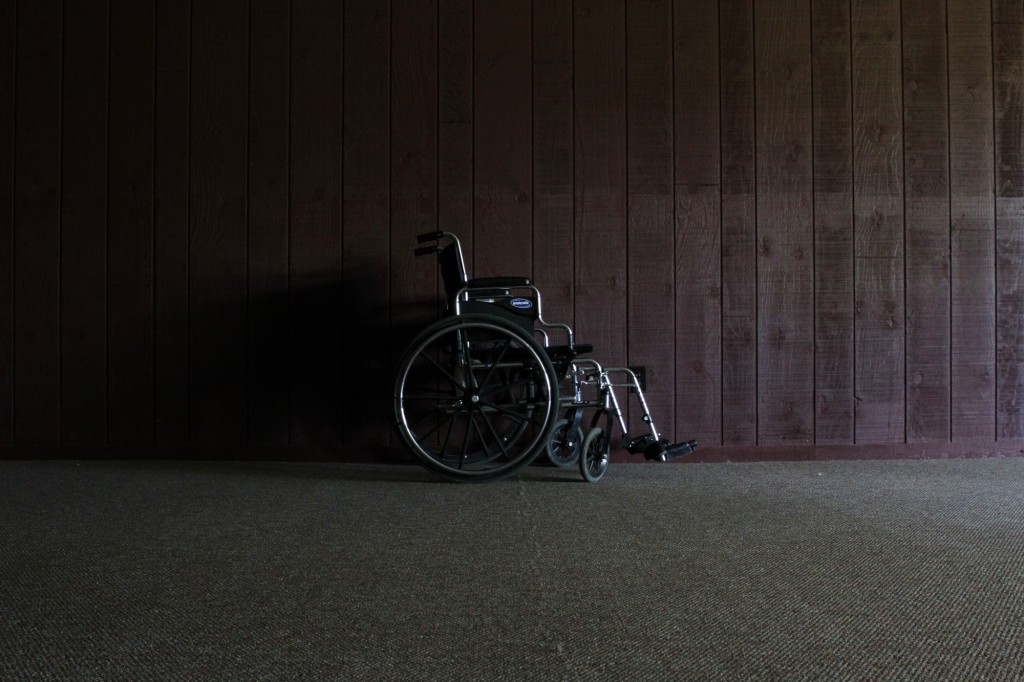Photo by Gina Easley. www.GinaEasley.com
By Kristin Wagner
I can see life outside through a rectangle.
The sliding glass door to the back of our house is large and unobstructed and like a huge movie screen, a world happening within four sides.
I am a spectator, observing the sway of branches in a wind that would snatch my breath away, the fury of rainstorms that tinge the sky green with a sudden drop in barometric pressure that I could feel squeezing and pulling my body, the gentleness of sunlight sparkling on snow that would have twisted my muscles too tight in the cold. I stayed inside because I had to. I watched the world outside through this frame because it was all I could do to be a part of the outside world.
Summer is so unforgiving in its beauty and its heat. I wish ugliness and boredom. I wish heat came automatically with a barren dry hellscape, a vision I could feel justified in closing the drapes against, scenery no one would blame me for hating. I wish 100 degrees came without sprinklers and snow cones and dusk and lightening bugs and the smell of tomato plants growing so that I didn’t sit inside filled with envy and lost opportunities. The rectangle of outside life I can see is gorgeously blue and peony pink and sunflower yellow and vibrant green. Each time I pass into that world, though, I can only stay a little while before I seem to collapse in on myself, the cell walls that keep my body upright softening like ice cream and falling inward into an inevitable puddle.
Winter is unforgiving in its beauty and its cold. When it’s ugly and slush-gray on the ground and slate-gray in the sky, I can convince myself that there is nothing more to want than coziness and movies and warm food. But often enough the rectangle I can see is dazzling with diamonds, the sharp outlines of black branches tangled in the most lovely way, dashes of red as cardinals flit in and out of our hedges and the sun in winter comes at a clean-edged new angle. I remember that the air in winter feels cleaner, the cold coming through your lungs seems to purify the world and I want to be outside to feel that. But to feel the cold means that my muscles will react like starved and beaten dogs flinching and retracting away from a threat, and I can’t risk that, not today.
Sometimes the rectangle is a movie screen, showing reels of action that I may watch but not participate in. Snowball fights where the hit and explosion of powder occur just off stage right, the cinematographer giving just the edge of a child bending and scooping snow. The director that allows me glimpses into my children’s outdoor lives makes sure not to give away too much. I’m allowed a quick impish glance at the camera before the characters run off again—where they’re going and what they’ll do next a mystery. The rule for playing in the snow without me is that I have to be able to still see them through the rectangle without much effort. Within earshot is too far away. Within my line of vision is the right distance, where I can bring them back too soon because if I don’t, if I wait too long, I will not have enough energy for pulling off boots and making hot chocolate.
Life as a spectator is not bereft of joy, but it is not a participatory kind of joy. It is observational and it requires that you truly love the subjects of your observation; you must not be consumed with envy at their joy. There are certain people I do not love enough to merely watch them being happy without me. Children are different though, because I would gladly walk through broken glass for them. This is nothing so dramatic—I simply have to find contentment in looking through unbroken glass instead of being on the other side of it.
•••
Sometimes I determine that I have to be a participant, that I have to be active. Sometimes it may be a function of time, a calculation of how long it has been since I joined in. Sometimes my calculations encompass the savvy of a Las Vegas odds-maker and determine that the risk is outweighed by reward. Sometimes I find that I cannot abide simply watching another minute longer.
One winter day, strep had overtaken my usual illness, the sharp rasping swallow punctuating normal exhaustion. My oldest was finishing his basketball season, and at the last practice the parents were invited to join in games. Despite being practically bed-ridden for months, I did. I put on sneakers and threw a headband over my hair and tried to coordinate my body in ways I had never tried before for relays, and I called plays I didn’t understand, and I ran all-out sprints. It felt silly but I wanted him to remember this effort, this effort to overcome my embarrassment and illness for him at least for a bit. I dropped every ball thrown my way, and it would hit my foot and skitter off and I was trying to show him that these things can be laughed off, that trying new things will mean mistakes that are survivable. Lessons I felt like my boys weren’t hearing often enough—that they were worth my effort, and embarrassment is temporary, and joy can happen in the midst of epic failures of skill. Sometimes I understand that showing them what that can look like means more than telling them.
We got to a game where only three players were on the court at a time. My kid and I and a teenage boy were to take over a few roles. The older boy and I would play offense and my guy would play defense and the only goal was for offense to get the ball through the hoop. Every other parent got the ball to the teenager, and the teenager took a shot. This time the teenager threw the ball to me, and I actually caught it without a fumble or bobble. Stunned, I realized I was near enough the hoop that even with my stubby, weak, and unpracticed arms, I might have a shot. I pivoted to the hoop and, as I lifted my eyes, brought the ball up, and it began to leave my fingertips, it was smacked out of the sky inches from my nose. I was dumbfounded and all I saw was the line of other parents, children, and coaches with huge eyes and even bigger surprised smiles having witnessed my son fly through the air higher than ever before to knock that ball out of the sky. Epic. It was epic. We all laughed helplessly for minutes on end, kids recreating his block and other kids recreating my stunned expression.
My guy was so pleased with himself, but then the light for him went out for just a moment as he whispered to me, “You could have really made it in—I am so sorry.” He realized that he would have been devastated to be robbed of a moment of triumph that no one expected to see.
But how can I explain to him, that for my effort I got to be a player on the movie screen, a key foil needed to create an amazing unrepeatable moment? That I got to be in the scene instead of the audience for once? That I was within the frame of the rectangle, on the other side of the glass and be there to assist in something great? He would be given an award for the best defensive play of the season, against his own mother, when we got the end-of-the-season ice cream.
And how can I explain to him that the spectators to the scene mattered as much as the actors? That their smiles and laughter meant as much to the moment? That the people watching and the people doing are inextricably bound together and one is just as important as the other, that the rectangle I sometimes have to view life through is not a movie screen with the actors unaware that the movie-goers even exist?
How can I explain the joy of knowing that when I am only able to watch, I matter as much as when I am able to act?
•••
KRISTIN WAGNER is a creative non-fiction writer, a former teacher, a mother to two school-aged boys, a wife, and a person with a collection of chronic illnesses. When those illnesses allow, she posts at kristindemarcowagner.com on topics ranging from disability advocacy to making cupcakes with her kids. Other publishing credits include essays at The Manifest-Station (on illness and parenting), and The Rumpus (on teaching and caring for students), and right here at Full Grown People (on teaching and caring for students and parenting).


 Follow
Follow

